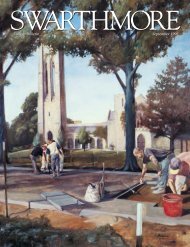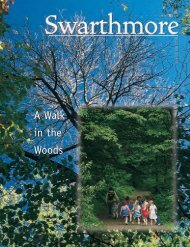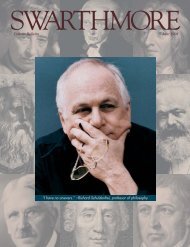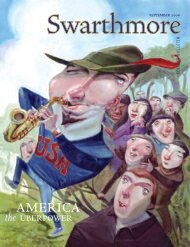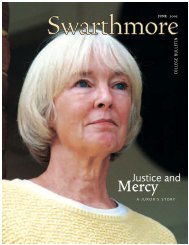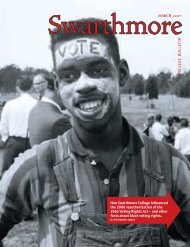Vietnam
Swarthmore College Bulletin (June 2006) - ITS
Swarthmore College Bulletin (June 2006) - ITS
- No tags were found...
Create successful ePaper yourself
Turn your PDF publications into a flip-book with our unique Google optimized e-Paper software.
profileEducational IntrapreneurWALTER CLARK ’54 SURROUNDS STUDENTS WITH NEW ENGLAND LANDSCAPES AND LITERATURE.“The challenges of the NELP environment jolt people awake andoffer the opportunity to mobilize new energies,” Clark says.Imagine being able to spend 6 1 ⁄2 weeks reading Hawthorne,Frost, Brown, Emerson, Dickinson, and Thoreau.Imagine a place with no TVs, computers, cell phones, telephones,VCRs, newspapers, iPODs, radios, alcohol, or drugs.Imagine hiking through snow drifts on Franconia Ridge in NewHampshire; or canoeing the wilderness route Thoreau describes inThe Maine Woods and then reading passages from the book around acamp fire; or reading Hawthorne’s Roger Malvin’s Burial, based onthe 1725 Indian defeat of a group of Massachusetts bounty hunters,before climbing Mt. Chocorua within sight of the encounter.The place you imagine is real. It exists in the form of the NewEngland Literature Program (NELP). NELP was co-founded in 1974by Professor Emeritus of English Walter Clark ’54, of the Universityof Michigan-Ann Arbor and his colleague Professor Emeritus ofEnglish Language and Literature Alan Howes.Guided by 12 staff members, 40 students spend parts of May andJune in small classes dedicated to reading, discussing, and journalingtheir thoughts on New England writers. Other authors haveincluded Frederick Douglass, Louise Gluck, Sarah Orne Jewett,Galway Kinnell, and e.e. cummings.NICK CHINAlthough the setting may be pastoral, journal entries and activeparticipation in discussions are integral to determining a student’sgrade. The program is open to college students around the world.“When one is taken out of one’s accustomed habitat, there is adisorientation and reorientation very conducive to new learning,”Clark says. “The opportunity to read literature in the environmentwhereitwaswritten,orinalandscapedescribedinthework,issignificant.”Students travel in a caravan of minivans from Ann Arbor toCamp Wohelo on Lake Sebago in Raymond, Maine—a location,Clark points out, that is just a mile from where Hawthorne lived inhis youth. Housing is in unheated cabins, but there are heatedspaces for discussions or reading. The prohibition of any distractions—suchas electrical devices and alcohol—is important. “Wewant nothing here that can divide people,” he says.Along with the academic sessions, students are able to take noncreditclasses where they can learn about nature, canoeing, art, orcamping. Meal preparation and the cleaning of common areas aredone by students and faculty together.Clark says his education at Swarthmore and a subsequent graduateseminar with Israel Scheffler, a Harvard philosophy professor,gave him insight into the importance of small classes, and the significanceof eye contact with and among students in the classroom.“A class where students face each other in a circle can have a substantialimpact on the quality of discussions,” Clark says. “We pickup inaudible cues from one another.When Clark first proposed the idea of NELP, which is fundedthrough the University of Michigan’s English Department, his peerswere skeptical, but 32 years later, the program is thriving.Jessica Pulver ’02, an English teacher at a private languageschool, participated as a staff member last year. She says, “Studentscome to NELP primarily seeking a personal challenge. The studentstend to be introspective and self-aware from the outset, and thiscomes to the fore as they record their experiences in their journals.The journals are what I think the students take away from the experiencemost. They have a hard time parting with them at the end ofthe program when staff members take them away to grade. Abstractly,I think the students take with them a sense of maturation, a feelingof having been stretched and prodded to assess what is importantto them in many different ways.”Although Clark retired from teaching in 1993, he still occasionallyteaches a NELP course. His impact on the program and the philosophyof Alfred North Whitehead, upon whose ideas he foundedthe program, remain evident. In Whitehead’s words: “The justificationfor a university is that it preserves the connection betweenknowledge and the zest of life, by uniting the young and the old inthe imaginative pursuit of learning.”In this, Clark and NELP succeed.—Audree Pennerjune 2006: 55



